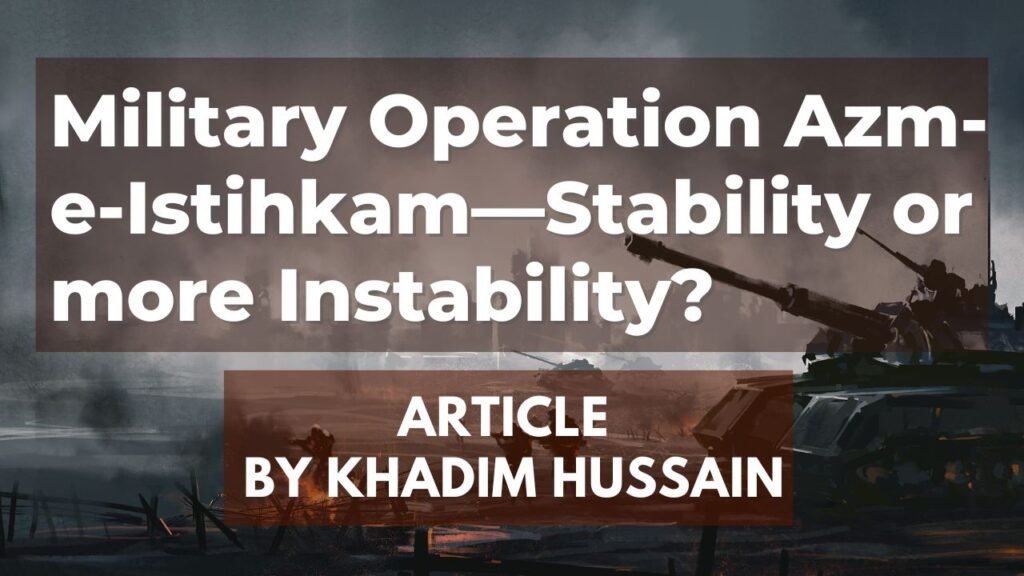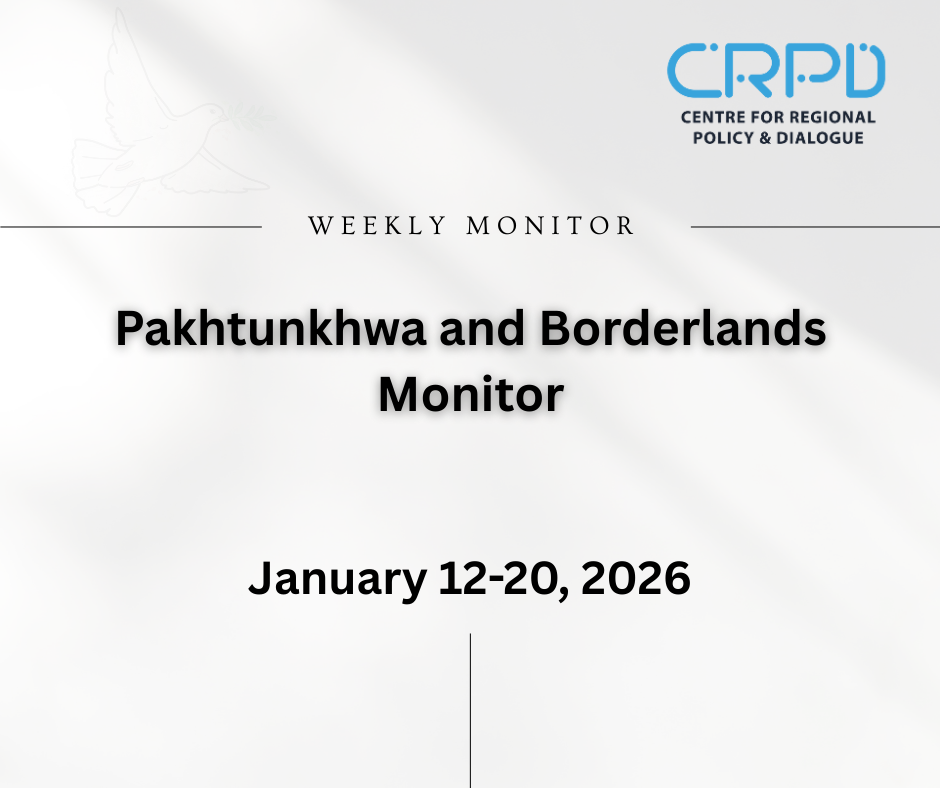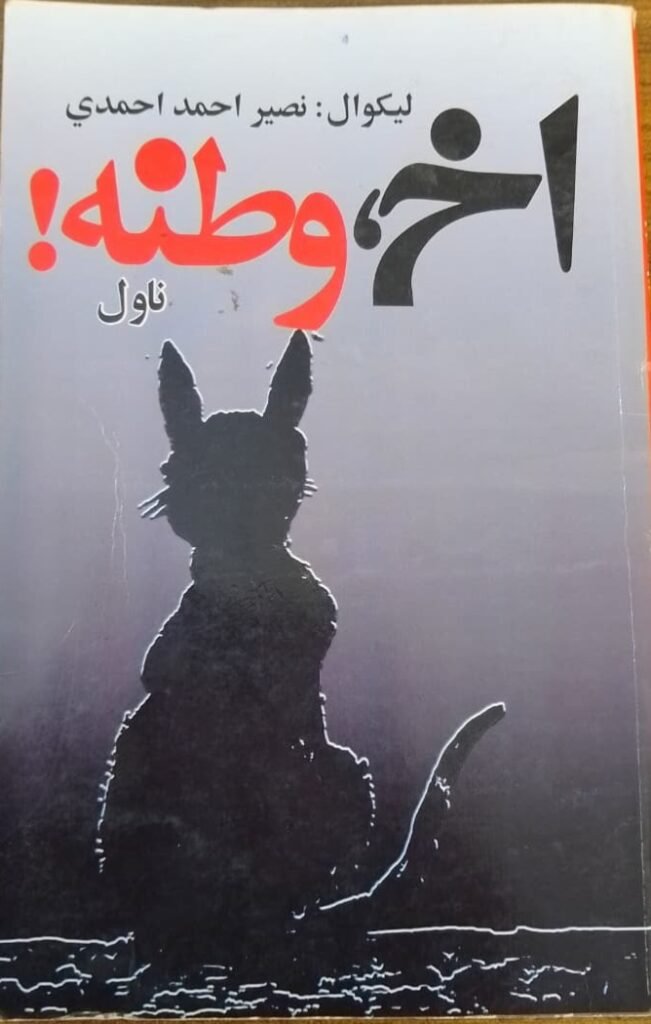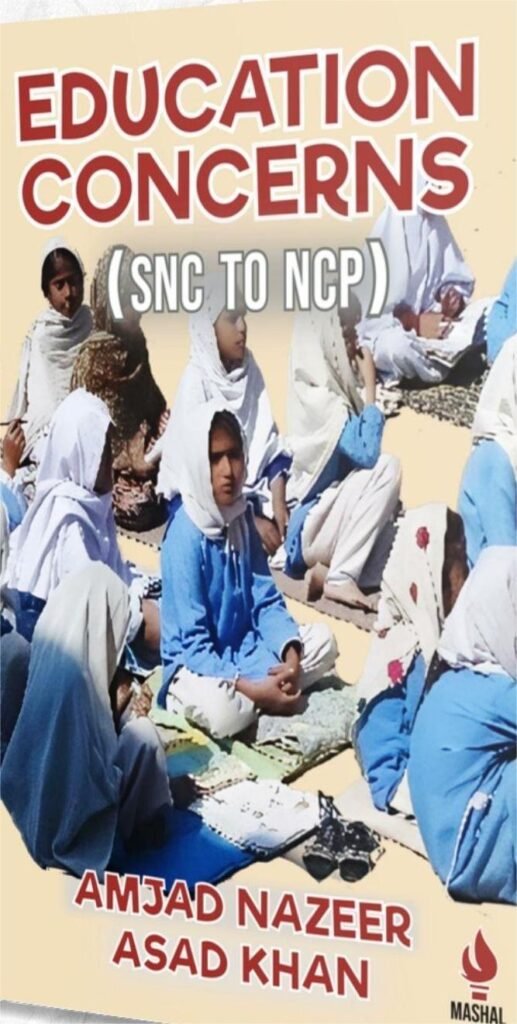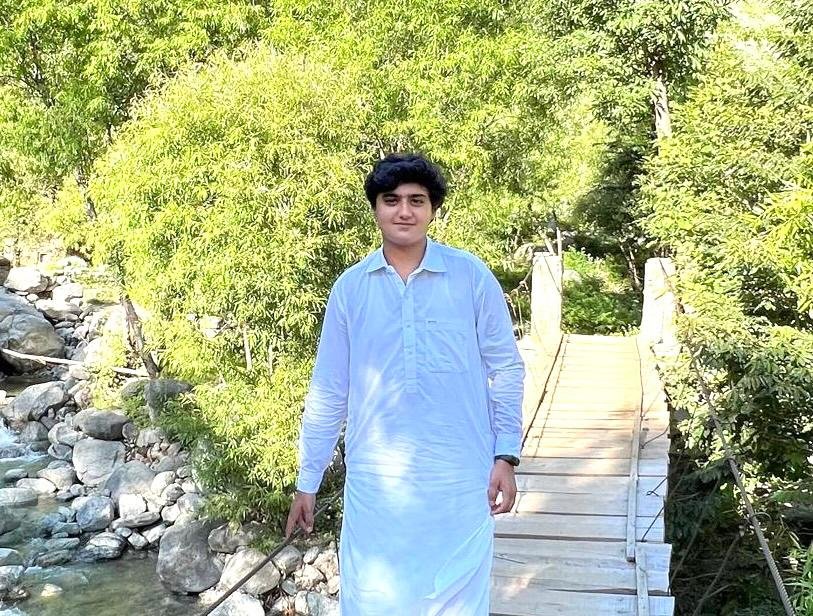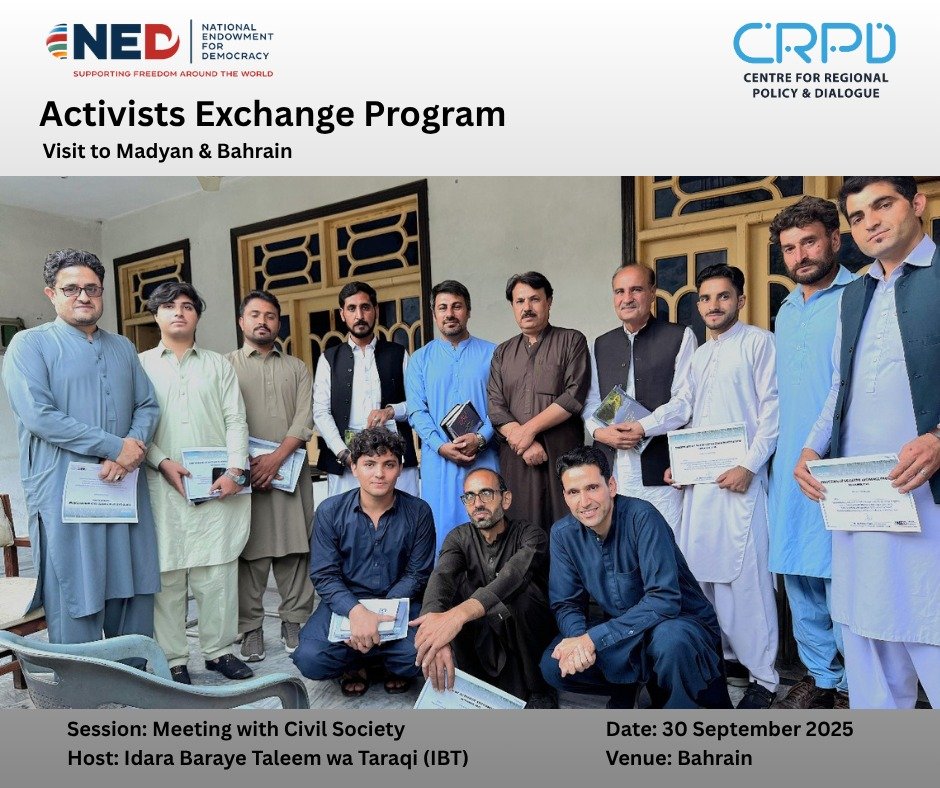Khadim Hussain
June 25 2024
The PML (N) federal government approved another military operation after a meeting of the Apex Committee, a committee consisting of all chief ministers, relevant federal ministers and services chiefs chaired by the Prime Minister, was held on June 22 2024. The military operation is said to be a “reinvigorated and re-energised national counterterrorism [CT] campaign through the launching of Operation Azm-i-Istehkam”. The military operation is claimed to be a “multi-domain, multi-agency, revised National Action Plan” to “root out terrorism, the crime terror nexus and violent extremism” and which is claimed to be carried out “with support from all law enforcement agencies, as well as effective legislation to address legal voids that hinder effective prosecution of terrorism-related cases”.
The current military operation is announced at a time when the memories of the two recent military operations are still fresh in the minds of the people of Pakhtunkhwa and Balochistan—the Zarb-i-Azb, launched in 2014 by Gen Raheel Sharif to root out terrorists in North Waziristan, and Raddul Fasaad, carried out in 2017 under Gen Qamar Javed Bajwa—if not to talk about the scores of the military operations carried out in various parts of Pakhtunkhwa and the newly merged districts of Pakhtunkhwa between 2004 to 2014. Large scale displacement, demolition of homes and hearths, destruction of businesses and capital, decimation of socio-cultural assets and institutions, loss of thousands of civilian lives and unbelievable sufferings of women and children are the hall mark of these military operations. Every previous military operation was wrapped up with the announcement that the back of terrorists had been broken but every time the banned militant organizations had regrouped and reorganised to disrupt socio-cultural and socio-economic lives of the common people.
The government claims that it will put the issue in parliament for debate but previous experience of the common people of Pakhtunkhwa and Balochistan informs them that the final say in the implementation of security related policies lies with the security establishment. The people seem to be sceptical about the method of approval of the military operation and also about the intent of the government and the security apparatus behind the military operation. No objective of the classical “demilitarization, deradicalization and rehabilitation” has so far been observed to be achieved after any of the scores of the previous military operations over the last twenty years.
Though the common people in Pakhtunkhwa strongly resent the ever-increasing influence of and attacks by the terror and armed extremist groups in most of the southern districts, the newly merged districts and the Malakand Division but they have an equal amount of resentment against the presence, influence, check posts, blockades of free movement, more securitization, occupation of their resources and disruption of their business and trades by the security apparatus. The promulgation of the Action in Aid of Civil Power in 2019 till date, which allows the security forces to pick anyone anytime without any due process and which allows internment centres, has compounded the situated even more and has turned lives of the common people into a virtual hell. The people think that the previous operations were carried out not for restoring peace but for the interests of the Americans and the West. This time they think it is for the interests of the Chinese. They think that the irreparable losses and sufferings were incurred by the people of Pakhtunkhwa and Balochistan but the profits were reaped by the security apparatus and the elite of Pakistan, belonging mostly to Punjab. The perceptions, even if they are only perceptions, are what actually matter.
The 20-point National Action Plan (NAP), referred to during the announcement of Azm-e-Istikam, was endorsed by a whole spectrum of the political leadership and military establishment back in 2014. The NAP included the points, among others, that militant outfits and armed gangs would not be allowed in the country, there would be zero tolerance for militancy in Punjab, the Counter Terrorism Authority would be strengthened, strict action would be taken against all media that promoted hatred, extremism, sectarianism and intolerance, financing for terrorist organizations would be choked, dedicated counter-terrorism force would be established and deployed, re-emergence against proscribed organizations would be ensured, effective steps would be taken against religious persecution, registration and regulation of religious seminaries would be implemented, revamping and reforming the criminal justice system would be carried out, glorification of terrorists and terrorist organizations through print and electronic media would be banned, Balochistan government would be fully empowered for political reconciliation with complete ownership by all stakeholders to negotiate with Baloch insurgents, sectarian terrorists outfits would be strictly dealt with, death sentence of those convicted in cases of terrorism would be implemented and special trial courts would be established under the supervision of Army for two years. Out of the 20 points envisaged by NAP, only the trial courts under the Army were established immediately. Moreover, a number of laws have been implemented in the shape of PECA etc to suppress dissenting voices in the garb of fifth generation war since then.
While extremism and fanaticism continues to be taught at schools, hatred against minority sects and religious minorities continues to be imparted in many religious seminaries, sectarian and fanatic sermons continue to be released from loud speakers, horrible lynching continues on the mere allegations of blasphemy throughout the country, persecution of the religious minorities continues unabated, the gun touting and stick wielding violent extremist gangs continue to roam around the country freely and target killings, terrorist attacks on public places, police check posts and security forces continue with impunity, ANP leadership and the people of Pakhtunkhwa and Balochistan keep asking about the reasons for not implementing the 20-points NAP agreed upon by the whole political leadership and military establishment in 2014. No answer from the power corridors.
During the debate on action against militancy for restoration of peace, one can clearly see a proclivity of the mainstream Pakistan, the security establishment and the Punjab-based political parties to club the insurgency in Balochistan and terrorism by private extremist armed militias and stick wielding sectarian gangs active in Pakhtunkhwa and Punjab. The clear distinction between insurgency and religious and sectarian terrorism must not be blurred. The insurgency in Balochistan is rooted in socio-political and socio-economic exploitation, has a wide ranging explicit and implicit support among the masses and can only be dealt with through long term hectic negotiations through political forces. The confidence building measures for such long-term negotiations must be started with the immediate end to enforced disappearances and retrieving of the ones who are already victims of enforced disappearances. The terror and sectarian outfits have no public support and could be dealt with a multi-pronged strategy—an end to the so-called strategic depth policy, dismantling the project Taliban and the use of prudent kinetic force with the support of the elected parliament, provincial assemblies and common masses.
Another intriguing issue arises regarding safe havens provided to the terror outfits by the Emirate in Afghanistan during the debate on neutralising the threat posed by the terror outfits. Interestingly, the same Emirate was enabled by the US with an active facilitation by Pakistan to topple the elected government of Afghanistan after Doha Deal in Aug 2021. The then Prime Minister of Pakistan called it “breaking of the shackles of slavery”, a PML N leader equated it with “the power of Allah”, the JUI-F leader congratulated the Afghan Taliban for the “conquest” and the then DG ISI wasted no time to reach Kabul to have a cup of tea there. The ANP leadership cried hoarse that the fall of Kabul to a private armed extremist militia would lead to more terrorism in Pakhtunkhwa and Pakistan but all this fell on deaf years. How can the government of Pakistan convince the Emirate to deny safe havens to the terror outfits active in Pakhtunkhwa and Pakistan is a question that still remains unanswered.
As if this were not enough, the then DG IS Gen Faiz and the then spokesperson of the PTI provincial government Barrister Saif with the support of the then PM Imran Khan and the then Army Chief Gen Bajwa, arranged jirgas to negotiate with the TTP without taking the provincial assembly and parliament into confidence. Resultantly, thousands of fighters were repatriated to the newly merged districts and Malakand Division of Pakhtunkhwa. The then President Dr Arif Alvi decreed the release of 102 hardened terrorists. The ANP leadership again raised voice against this appeasement inside and outside parliament but nobody cared to listen.
During the present debate on the recently approved military operation ‘Azm-e-Istihkam’, the ANP leadership has put forward some valid conditions to be considered by the federal government and the military establishment. First, a thorough audit of all the previous military operations must be carried out and the responsibilities must be fixed—a kind of Truth Commission should be established. Second, those who have repatriated thousands of fighters without taking the parliament into confidence must be held accountable (ANP leader, Aimal Wali Khan, had filed a petition in the Peshawar High Court against this repatriation but instead of hearing the petition, the Hon Chief Justice had issued a contempt of court notice to Aimal Wali Khan). Third, all the relevant assemblies and the parliament must be taken into confidence before any new military operation is launched.
It is now up to the federal government and the military establishment to heed sane voices for restoring peace and stability or sow more seeds for instability. Will more laws be enacted to suppress dissenting voices or the existing laws for stemming the tide of extremism and terrorism be implemented with sincerity? Fingers crossed.
The writer can be accessed via khadimhussainpajwak@gmail.com .
